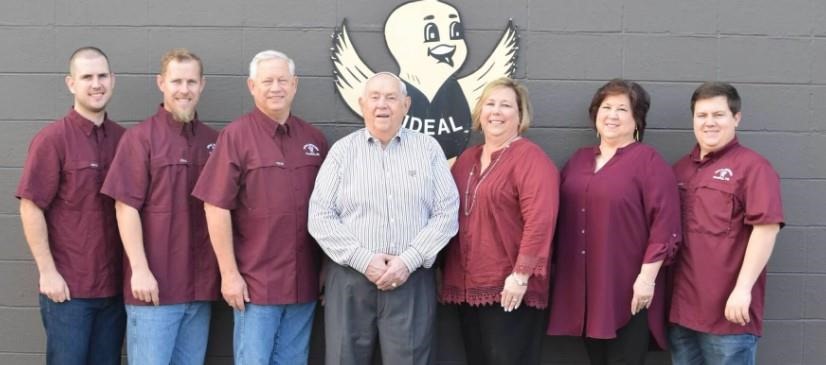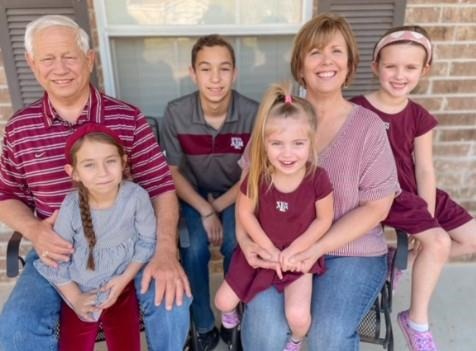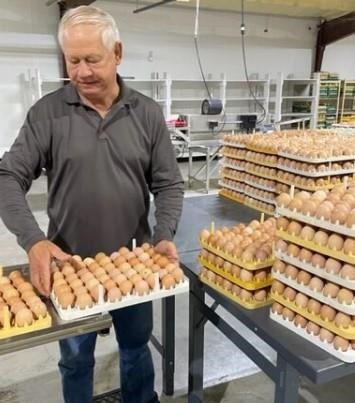It is rare these days to come across a family business that started and continues to be run by the same family over 85 years later.
But the Fuchs family with Ideal Poultry Breeding Farms Inc. can claim that rarity. The Department of Poultry Science in the Texas A&M College of Agriculture and Life Sciences has played a role in their sustained success over four generations.

Three generations of the Fuchs family currently run Ideal Poultry. From left: Nathan Fuchs ’12, Stephen Fuchs ’09, Gary Fuchs ’78, Monroe Fuchs ’56, Teri Adcox ’90, Janet Crouch and Kevin Crouch ’15.
A story of survival
Founded in 1937 by brothers Leo and Theo Fuchs as a means to make a living and support their families coming out of the Great Depression, Ideal Poultry’s story is one of survival to success.
The company has grown through the years to become a leader in the production of non-commercial poultry, selling more than 6 million chicks, ducks and other young poultry annually, according to their website.
They attribute their success to following sound Christian principles and providing quality products and service to their customers, backed by knowledge many family members received at Texas A&M University.
From 1946 to 1973, Leo and his wife, Edna, were the sole owners of Ideal Poultry until they sold the business to their youngest son, Monroe Fuchs ’56. The third generation of Fuchs, siblings Gary Fuchs ’78, president; Janet Crouch, vice president, secretary and treasurer; and Teri Adcox ’90, vice president, all of Cameron, oversee operations.
The fourth generation of the Fuchs family, many of whom are also Aggies, have followed in their parents’ footsteps and are helping manage the family farm of more than 50,000 poultry breeders. Ideal Poultry currently hatches 79 standard chicken varieties, 58 bantam varieties, nine breeds of ducks, three breeds of geese, four breeds of guineas and nine heritage breeds of turkeys, ring-necked pheasants and chukar.
Giving back to future generations

Gary ’78 and Susan ’85 Fuchs, along with their family, understand the importance of giving back and promoting agriculture education to future generations.
The Fuchs understand the value of a quality education and what it can do to help a business succeed. The family is dedicated to helping future generations of Aggie poultry scientists and producers through four endowed scholarships.
“The donation to the department began with my father’s decision to establish a scholarship in honor of my grandparents, Leo and Edna,” Gary Fuchs said.
Following the legacy of giving established by their father, the siblings continue to support the department.
“Our family and our business have tried to support the Department of Poultry Science through the years,” he continued. “The endowments were an expansion of our support program and a demonstration of our commitment to the future of the department and the poultry industry.”
Following Monroe Fuch’s initial gift, and due to their success with Ideal Poultry, the Fuchs family was able to establish the Monroe H. Fuchs, the Susan and Gary Fuchs and the Janet and D.A. Crouch scholarships for poultry science students.
With 10 Texas A&M graduates in the family, it is no surprise the Fuchs family values the education and experiences the university can provide and want to provide those opportunities for others.
“I never knew there was any other university growing up,” said Gary Fuchs.
Knowing and working with many of the poultry science faculty members as he was growing up contributed to his decision to attend the university. Below, Gary Fuchs expands on his time in the department and what it is like to lead a multi-generational family business.
Why Texas A&M and poultry science?
Growing up, I knew several poultry science faculty members because of our involvement in the industry. Roy Fanguy, Ph.D., assisted me with my high school science fair project lab work, and W.F. Krueger, Ph.D., and others were regulars around our facilities as consultants.
The department was fairly small in 1974-1978, allowing students to develop relationships with faculty and staff. That’s something I believe is still the case, even though the department is larger now. But back then, I believe it was common for my fellow classmates and I to be fond of C.B. Ryan, Ph.D., who coached the judging team. In that period, it was not like it is now with competition to make the team, and we organized it so four students each year would make up the team. Dr. Ryan was good to work with and a great mentor to many of us.
Did you have a favorite poultry science class?
Poultry Products was my favorite. During the mid- to late-1970s the development of further-processed poultry meat products was an ongoing project. As part of the lab work for class, we had the opportunity to evaluate several products as they were being developed.
What advice would you give to students interested in pursuing a career similar to yours, whether that be running a family business or a hatchery?
Honestly, there are not a lot of careers like the one I have through our family business. However, if you do have a small business opportunity a few things come to mind: learn your business, stay focused on what you do best, produce good products, have great customer service, do not be afraid to adapt to changing business conditions and maintain your business integrity.
What do you do at Ideal Poultry?
I began working at Ideal immediately upon my graduation in May 1978. My initial role was breeding farm manager. When the need arose a few years later, I added the role of hatchery manager to my responsibilities.
I like to say the title of president is a corporate title and as a practical matter has nothing to do with the actual jobs I do as part of our operations. Quite a bit of what I do now is observational and supervisory.
I assist in the management of the hatchery and the breeding farm. Most significant in my current role is the organization and selection of the breeding pens for our replacement breeders. I am also involved in the organization of our breeder hatches and the selection of day-old chicks for our future breeding stock.
As a small family business, we adapt ourselves to a variety of roles as needed. Over the years I have learned to be a plumber, electrician, incubator repairman, vaccination crew member, chick sexer and almost anything else. The general rule is that everyone is available to do whatever is needed for the success of the business.
What is your favorite thing about your job?

Gary Fuchs ’78, loads eggs into the egg hatching sanitizer. As president of Ideal Poultry, Gary has learned to fill many roles over the years to ensure the success of the business. (Courtesy photo)
I enjoy working with the genetics side of our business. Over the years we have worked on projects to develop an exceptional broiler chicken for youth broiler shows, developed new breeds of bantams, introduced genes to allow for feather sexing of numerous rare breeds of standard chickens and many other projects to produce products that are acceptable to our customers.
We work diligently on breed selection and productivity in our chickens. Many of our current breeds were not efficient in egg production, hatchability or breed characteristics when we attained our first breeding stock. In some cases, we have worked through many generations of poultry to establish a quality product.
How many generations of the Fuchs family are currently working at Ideal Poultry?
Over the years, four generations of the family have contributed to the family business. Currently 13 family members work for Ideal Poultry. Of those 13, 10 are Aggies.
Here’s a rundown of the family members, their major if they attended Texas A&M, and position in the company:
- Monroe Fuchs ’56, poultry science, retired.
- Gary Fuchs ’78, poultry science, president.
- Susan Fuchs ’85, technical education, support.
- Janet Crouch, vice president and secretary/treasurer.
- D. A. Crouch, support.
- Teri Adcox ’90, business administration, vice president.
- Dennis Adcox, support.
- Stephen Fuchs ’09, poultry science, breeding farm manager.
- Mikaela Fuchs ’09, poultry science, support.
- Nathan Fuchs ’12, poultry science, hatchery manager.
- Ashley Fuchs ’13, poultry science, support.
- Kevin Crouch ’15, ag leadership and development with a minor in poultry science, sales manager.
- Kristen Crouch ’15, ag leadership and development with a minor in animal science, marketing director.
Do you have any key mentors in your life?
I’ve always looked up to my parents and grandparents. Things like respect for others, integrity and sharing are among the important things they taught me.
In some of the documents about the history of our business, a recurring theme is the production of quality products and having satisfied customers. I think we learned these things from our predecessors and try to maintain those goals in our current business structure.
What is your favorite poultry dish?
Chicken and dumplings.
Source : tamu.edu